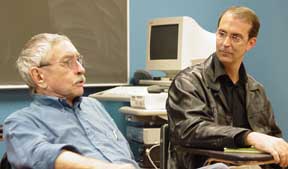I am sitting in one of the reserved seats in the fourth row of Dana Auditorium, a seat that is certainly not reserved for me, among a lot of excited octogenarians. We are waiting for Edward Albee to speak. The playwright is described on the Guilford website as a master of American theatre, and last Wednesday night he lectured about the state of theatre and the arts in America.
Albee enters.
He has a gravelly voice. He begins his lecture talking about his childhood and education. He was an orphan who was adopted by a wealthy family that he didn’t get along with. He only went to private schools, most of which he was kicked out of for what he calls “Gandhian passive resistance”. He just didn’t go to classes.
“The function of formal education is to teach you how to educate yourself,” said Albee. That is what he learned at the private high school Choate, the only school from which he has ever graduated.
Yet, Albee is a Pulitzer Prize winner and a distinguished professor at the University of Houston. “I am probably the only distinguished professor of anything in the entire Texas school system who does not have a college degree.”
Albee, despite a limited knowledge of farce and a singular knowledge of sex, wrote a 3-act sex farce when he was 12. However, he likes to consider “The Zoo Story” his first play. He can’t keep track of how many plays he has written since then; he estimates 27 and one half.
Albee tells the audience, “I enjoy being a playwright. Maybe I do it as an act of aggression against the status quo.”
Albee does not like the state of theatre these days in America because it has become so expensive to produce that usually, only rich white people can afford to enjoy it.
Albee is also worried that we are turning into a passive society that doesn’t want the boat rocked. He believes most audiences don’t want their values to be questioned. He speaks of the censorship from without and within.
“Censorship from within us is a desperately dangerous form. People want to be comfortable. The arts inform us – sometimes more than we wish to be informed. All art can change our perceptions and society.”
Albee also believes that our ability to create art is what separates us from the animals. He speaks of it as being part of the evolutionary process. “Oversimplifying slightly, our tails fell off and we grew art.”
Albee thinks we can fight this censorship. He says that we can have any type of society that we want and that if enough people demand good art, like plays by Beckett and Anton Chekhov, we can get it.
Albee ended his lecture by saying, “In a democracy we can have anything we want, and we get exactly what we deserve.”
Categories:
Edward Albee visits Guilford
Emily Hantz
•
October 2, 2003

Edward Albee visits Jack Zerbe’s theatre class (Megan Miller/Guilfordian)
0
More to Discover
